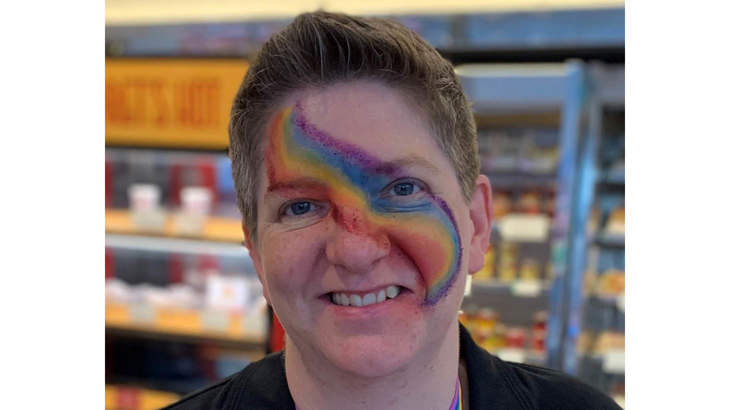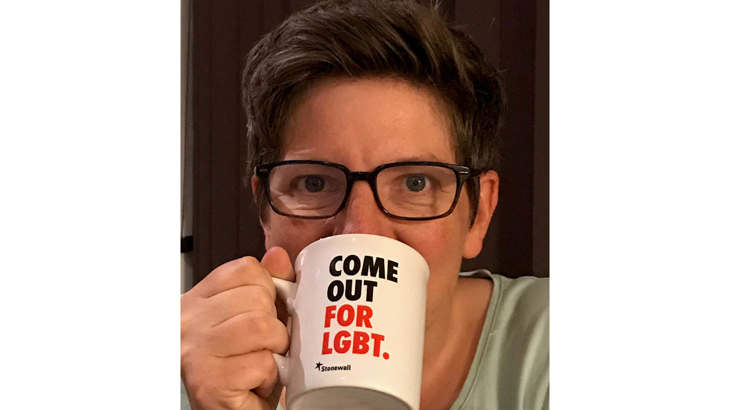Lesbian, Gay, Bi, Trans + history month is about claiming our past, celebrating our present, and creating our future. Here, our Head of Diversity and Inclusion, Cath Tomlin reflects on some of the LGBT+ history that she's lived through. And she explains how Sustrans is working towards being a charity for everyone.

How old were you in 1988 (if you were born)?
I was 15, a bit gangly, a bit awkward, a bit “different”.
I had an inkling of why I felt different but didn’t know who to talk to.
I couldn’t talk to my friends at school as none of them were going through the same thing (how wrong I was but none of us opened up…).
I couldn’t talk to my parents as they were both Christians and I feared the worse (also wrong!).
Who was left? Perhaps a teacher who I got on with?
The passing of Section 28
May 1988 was when the Government of the time enacted Section 28 of the Local Government Act.
This Act forbid councils to intentionally promote homosexuality or promote the teaching in any state-maintained school of the acceptability of homosexuality as a pretended family relationship. (Pretended? I mean, c’mon!)
S.28 meant that my teacher shouldn’t talk to me, advise me, console me about what was going through my head about being gay.
Thankfully she did.
Because all I can remember is the sense that what I was feeling about myself was frowned upon, that I was wrong somehow.
Then came Stonewall
That was also my first memory of LGBT+ activism, the marches going on in London.
And the newsreader, Sue Lawley’s face when the BBC 6 o’clock news was disrupted by a group of lesbians.
It was S.28 that led to the setting up of Stonewall, the LGBT Charity, who recently celebrated their 30th birthday.
Joining my first LGBT+ society
Going to university was a time for finding myself, and finding my first girlfriend, first gay bar, first Pride.
Like at school, being good at sports meant there was always somewhere I could feel comfortable and included.
But I also joined my first LGBT+ organisation – my university’s gay society.
Other than provocatively wearing my favourite baggy t-shirt of the time that had a big tick on the front (“D***, just do it”), I didn’t feel like an activist.
I just wanted to be me, and meet other people like me.
Wanting to find my place
Then when I started working, I realised that every time I met a new person who saw a wedding band on my finger, they assumed I was married (to a man) and asked what he did.
I always had that brief moment when that question flashed through my mind – do I tell them?
Like a lot of LGBT+ folk, I had been on the receiving end of homophobic slurs.
I always did tell, but it wasn’t always easy. And sometimes I was fearful of the response.
The university memory of wanting to find my place, my tribe, and feel like I belonged was never far below the surface.
Finding my work family
And yet it never occurred to me to set up an LGBT+ Network – some awesome people had that idea.
But I joined up as soon as I heard about it.
I’d found my work family.
Hearing other people’s stories, some tough, some easy, none straightforward, drove home to me the importance of workplace inclusion in all its various guises.
Not having to risk assess how someone will react.
Not having to censor what you say.
Being able to bring your whole self to work in order to focus on enjoying the job you’re paid to do, and do it well.

We've come a long way
And so to the present. Lesbian, gay, bi and trans equality has come a long way since 1988.
S.28 was finally repealed in 2003. I can now get married, adopt, serve in the military.
And not be sacked by my employer simply for being gay, which was entirely possible when I first started full time paid employment in 1996.
But there's still a lot more we need to do
But there is still a lot to be done.
A Stonewall report in 2018 showed that more than one in five LGBT+ people in the UK had experienced a hate crime or incident due to their sexual orientation or gender identity in the past 12 months, compared with 16% in 2013.
The hatred and vitriol currently on social media every day directed towards trans people is horrific.
We may have equal rights in UK law, but we don’t have equal rights in society.
Creating a more inclusive future at Sustrans
I’m now part of creating the future at Sustrans.
Sustrans has an objective to be a charity for everyone.
And we want to do this by incorporating inclusive thought and action in everything we do for our people (colleagues, volunteers, and supporters).
As well as for those in the communities we serve, in order to deliver our mission of making it easier for people to walk and cycle.
What we're doing at Sustrans to be more inclusive
Like most organisations, some parts are further along this journey than others.
I’m hopeful that we’ll have some employee networks soon (I’ll join the LGBT+ one straight away!).
And these networks will work alongside our established and passionate Equality, diversity and inclusion (EDI) groups in teams across the UK.
We all need friends and allies to support us
There is a huge desire and will to do this well at all levels in Sustrans, and from everybody that I’ve met so far.
A lot of those folk are allies, be they cis or straight.
We all need our friends and allies to support us, whatever our difference.
I’m glad my teacher was there for me in 1988.





